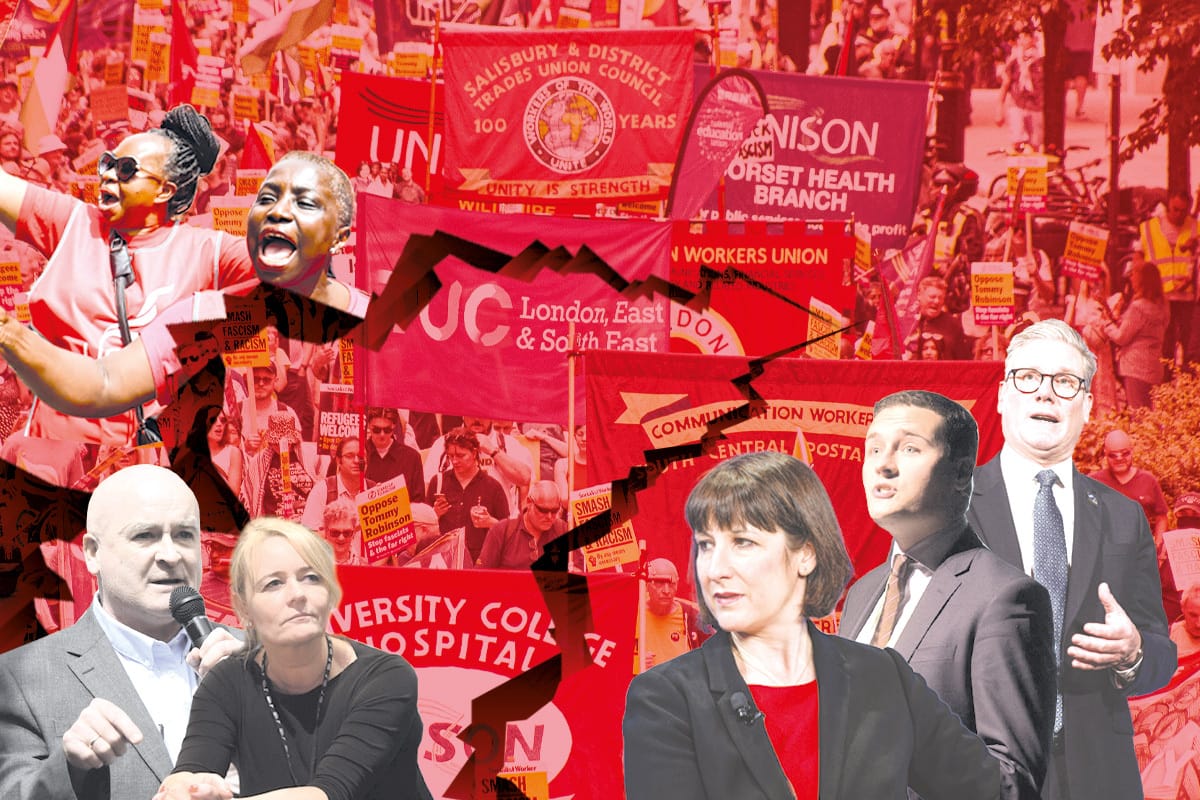After many months of trumpeting what it calls the biggest upgrade in workers’ rights for a generation, Labour’s so-called ‘New Deal for Working People’ has finally seen sunlight.
The first thought most workers will have is likely to be “is this it?”
Immediately apparent in Starmer’s ‘new deal’ is how much has been watered down. Zero-hour contracts, formally set to be abolished, are now allowed except where “exploitative” – a term that the government has seen no need to actually define. ‘Fire and rehire’ hasn’t been touched.
From initial promises of ‘day one protection’ for new workers, Labour’s proposals have already begun to shift under pressure from big business. They’re now promising a ‘lighter touch’ approach: reducing compensation for workers who are unfairly fired, and keeping employees under probation for longer.
That’s not the end of it. All this legislation will be subject to further consultation. Some estimates suggest that these laws won’t be on the books for up to two years. A nice rapid turnaround, then!
Offering crumbs
On the one hand, Labour have come to power fully intending to rule for the capitalists. That means preparing for cuts, privatisations, and attacks on conditions.

Already, the government has refused to intervene in the Grangemouth or Harland & Wolff collapses. Similarly, Reeves’ has repeatedly refused to nationalise failing Thames Water.
On the other hand, workers have put up with over decades of attacks from successive Tory and Labour governments. Life has become insufferable for the majority, with no hope on the horizon.
Pressure is accumulating in society. This finds its expression in Labour’s plummeting polling figures, as well as in rumblings amongst the rank and file of the trade unions.
Some crumbs are therefore necessary to try and head off trouble.
Under the surface
Against this backdrop, the fact that the consultation period for this package of laws is so long gives the game away.
This allows Labour to make a song and dance of “the greatest uplift to workers’ rights in a generation” in the press, and to sell this deal to union leaders who are desperate for something positive to offer their members.
The capitalists have publicly stated their nervousness, however. They raise all kinds of noises about the ‘added costs of doing business’ that these measures create – that is, the hit to the bosses’ profits, to use plain language.
By giving these grumblers a nice long consultation period, and watering down the more ‘troublesome’ legislation, Labour can thereby demonstrate their commitment to big business.
Furthermore, the government is attempting to sell their ‘new deal’ not so much as a programme ‘for working people’ but as an arrangement that will benefit the bosses: providing employers with a stable, reliable workforce, and thereby reducing turnover and disruption inside businesses.
In this way, Starmer and co. hope to carry out their capitalist agenda, while keeping the working class acquiescent for as long as possible.
Unfortunately for them, that aforementioned pressure is building up quickly – and an explosion is inevitable sooner or later.
Explosions to come
The conditions that led to the strike wave seen under the Tories haven’t gone away under Labour. Workers can only tolerate so much before they feel compelled to move into action.
The fact that Labour’s support amongst voters has rapidly evaporated is a serious sign that this government is sitting atop a volcano.

It is still early days. But the warning signs for Starmer are already flashing. And further crises and cuts could soon bring about a new spate of strikes and protest.
The union leaders’ passive ‘wait for Labour’ approach has already resulted in enough disasters.
What is needed is a militant programme of action, to force the government to give our class what it needs, alongside a socialist programme that can point the way forward to end the bosses’ attacks for good.
Playing the capitalist game by the capitalists’ rules can only produce one winner – and it’s not the workers. The sooner the trade unions abandon this path of conservatism and class compromise, the better.
‘Lighter touch’ dismissals – the great revolving door
Molly S.
Starmer’s ‘lighter touch’ dismissals process is just another knife in the back for the working class.
The government has proposed removing the two-year qualifying period to claim unfair dismissal, but at the cost of an increased statutory probation period of nine months.
Additionally, bosses can dismiss workers for conduct, capability, or ‘some other substantial reason’. And as anyone who has ever had a bastard boss knows, ‘some other reason’ is often no reason at all.
Under these new laws, employees would face an additional six months of precarious employment.
The idea that removing the two-year qualifying period is a concession to the working class is a sick joke. With waiting times for the first hearing in an Employment Tribunal currently averaging almost a year, this new policy would create a surge in applications and even longer waiting times.
At the same time, there is no genuine recourse for sacked workers who need jobs to survive. As Caspar Glyn, chair of the Employment Lawyers’ Association, has said, for employees dismissed on performance grounds, the ‘lighter touch’ process amounts to “bringing a day one right in through the front door and smuggling it out through the back door”.
As a ‘safe pair of hands’ for big business, the Labour government is committed to protect the interests of the capitalists. After years of heated class struggle and a resurgence in the labour movement, however, the government feels it has to give union leaders something to check the rising anger of the working class.
The result is this proposal, which amounts to little more than hot air and a complete betrayal of Starmer’s promises.
It’s clear that there can be no trust in Starmer and no trust in this Labour government. Workers need to take matters into their own hands.
Grangemouth and Harland & Wolff: The crisis of UK industry
Ben MacIntosh
Grangemouth is now in its dying days. The Labour government has all but confirmed that they will do nothing to save the hundreds of skilled jobs at the UK’s oldest oil refinery.
Despite vague promises at election time, the working-class community around Grangemouth have been betrayed.

Even the Labour MP for the area, Brian Leishman, has said that Keir Starmer’s promises are “nothing more than words on a bit of paper”.
A tranche of Scottish Labour MPs were elected on these promises back in July. Yet they have not lifted a finger.
As with the Port Talbot steelworks in South Wales, the bosses have decreed that not enough profit can be squeezed out of the workforce – and so they’ll all be disposed of.
With only whimpering trade union opposition, and an indifferent Labour Party in government, the final nails are being hammered into the coffin of British industry.
The trajectory of terminal decline is clear to see. Even firms that get a temporary stay of execution cannot avoid this fate.
The Harland & Wolff shipyard in Belfast was saved from closure by a deal in 2019. But it has once again fallen into administration – its titanic industrial legacy (literally) ready to be snuffed out.
Factories that have stood for more than 100 years are being let go without so much as a thank you from the billionaires that they have made.
McVitie’s biscuit factory in Glasgow: operating since 1925; closed in 2022. Albion Motors: founded in 1903; shuttered in 2024. The Sentinel Works in Shrewsbury: opened in 1915; final shift in 2024. SKF engineers in Luton: 1911-2024. Johnson Tiles in Stoke-on-Trent: 1901-2024. The list goes on.
Each time, hundreds of jobs are lost and future opportunities are gone forever. Even when there is state intervention, the people get screwed while the CEOs get rewarded.
Burntisland Fabrications in Fife was rescued from closure in 2017, thanks to an investment of £37 million from the Scottish government. The new Canadian owners paid just £4, and the business went bust again in 2020.
Whatever happens, the rich come out on top. Petroineos owner and industrial tyrant Jim Ratcliffe will make a cool £6 million out of Grangemouth’s closure. These scumbags plead that they just can’t make it work, while they take the money and run!
These closures are far from inevitable. Working people need jobs, and Britain needs manufactured goods. The problem is that the capitalists’ profits take priority over all else.
Instead, we need a system that prioritises the interests of our class. Let’s close down these vultures for a change!
Self-driving car crash
Maciej Krzymieniecki, Swansea RCP
Elon Musk is at it again. The snake-oil merchant has recently announced the Cybercab, which can operate without any driver input. Other companies have been working on similar concepts, including even self-driving lorries.
Under capitalism, automation has time and again meant mass unemployment and increasing exploitation. So, do transport workers need to worry about these developments?
The short answer is: No. Not anytime soon, anyway.
Mass roll-out of this kind of technology requires long-term investment on a gigantic scale – one that capitalism today is incapable of.
There are nowhere near enough electric charging points. The current self-driving technology is unable to deal with real road conditions. And geo-fencing thousands of cities, towns, and villages would cost billions.
Conservative regulations, trade wars, and protectionist policies will also suffocate any meaningful development in this direction.
Amusingly, Elon Musk has been promising self-driving cars for almost a decade. But every year, the ETA of this goal is pushed back.
In 2024, Tesla managed to produce a ‘functional’ prototype. But the devil is in the detail…which was missing.
Beyond flashy promo events for journalists, there are countless examples of partially self-driving Teslas crashing or being unable to navigate simple parking spaces. This is because Tesla cuts corners in production – for example, by refusing to equip the cars with better sensors (against its own engineers’ recommendations).
Musk’s latest spectacle was a piece of theatre, designed to satisfy gullible investors and maintain short-term profits.
Under a socialist planned economy, we could pool society’s resources and invest in practical, safe technology. Self-driving vehicles and better public transport would improve workers’ lives. Under capitalism, however, automation means the opposite.
These days, capitalism is stuck in a rut. It’s the task of the working class to tow this rotten system into the scrapyard of history.






